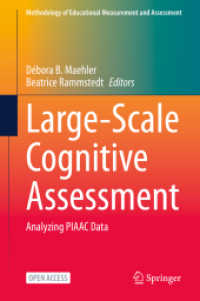- ホーム
- > 洋書
- > ドイツ書
- > Humanities, Arts & Music
- > Linguistics
- > english linguistics
Full Description
This study examines the representation of home spaces in three twenty-first-century Nigerian novels written in English, applying various spatial theories to analyse their portrayal. These contemporary novels, which center on family life, are set in different regions of Nigeria - a postcolonial nation characterised by diverse ethnic backgrounds, including Igbo, Yoruba, and Hausa communities. Despite their regional and cultural distinctions, the novels depict families in crisis as a unifying theme.
By situating the novels within their social and historical contexts and employing spatial theories, the research explores the underlying causes of familial dysfunction. It seeks to determine whether the rigid, hierarchical patriarchal structures present in many of the family homes reflect similar power dynamics at the national level. Furthermore, the study investigates how the oppressive political and social conditions of postcolonial Nigeria permeate the varied domestic environments portrayed in these narratives.
Contents
Theoretical Framework — The Home Spaces and Other Related Spaces in Purple Hibiscus by Chimamanda Ngozi Adichie — The Home Spaces and Other Related Spaces in The Secret Lives of Baba Segi's Wives by Lola Shoneyin — The Home Spaces and Other Related Spaces in Season of Crimson Blossoms by Abubakar Adam Ibrahim







